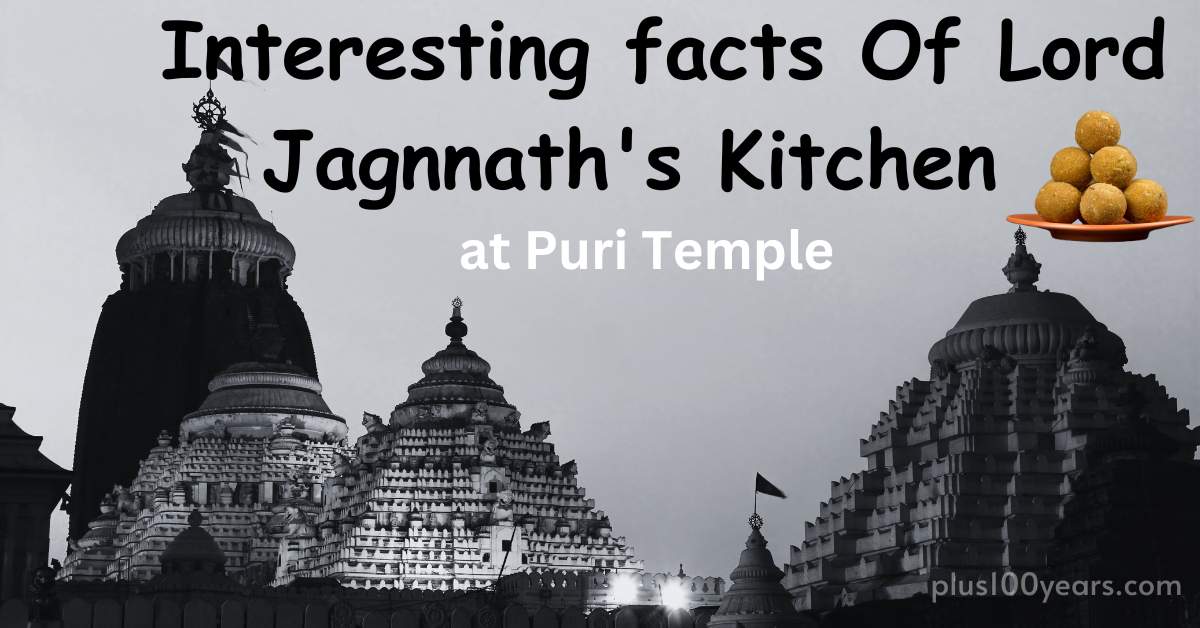
The kitchen of Lord Jagannatha in Jagannath Puri, also known as the Ananda Bazaar or Mahaprasad Bhandar, is a sacred and unique place where the food offerings for Lord Jagannatha, Balabhadra, and Subhadra are prepared.
Here are some lesser-known facts about Lord Jagannatha's kitchen
- The kitchen is the largest kitchen in the world: The kitchen of Lord Jagannatha in Puri is considered to be the largest kitchen in the world, where food is prepared in enormous quantities to serve thousands of devotees every day. It is said that the kitchen can cook food for over a lakh (100,000) people in just a few hours.
- No written recipes are followed: One of the unique aspects of Lord Jagannatha's kitchen is that no written recipes are followed in the preparation of the Mahaprasad (holy food offered to Lord Jagannatha). The cooks, known as "Mahasuara," rely solely on their culinary skills and generations-old traditional knowledge, passed down from their ancestors.
- Wooden Deities: The main deities of the Jagannath Temple, Lord Jagannath, Lord Balabhadra, and Devi Subhadra, are made of wood and are replaced with new idols every 12 or 19 years in a ritual known as the "Nabakalebara."
- Vegetarian food is cooked without onion and garlic: The Mahaprasad prepared in Lord Jagannatha's kitchen is strictly vegetarian and is cooked without the use of onion and garlic. This is in accordance with the dietary restrictions followed in the Jagannatha Puri temple, where only Sattvic (pure) vegetarian food is offered to the deities.
- Wood-Mysterious Empty Vessels: Interestingly, these vessels are always kept half-filled, but no one knows the exact reason behind it. It is considered a divine mystery associated with the temple
- Fired clay ovens used for cooking: The cooking process in Lord Jagannatha's kitchen is done using traditional wood-fired clay ovens, known as "chulas," which are considered sacred.
- Food is cooked in earthen pots: Another interesting fact about Lord Jagannatha's kitchen is that the food is cooked in earthen pots, which are considered to be pure and free from any impurities.
- No tasting is allowed during cooking: Unlike regular kitchens, where chefs taste the food while cooking to adjust the seasoning, in Lord Jagannatha's kitchen, no tasting is allowed.
- The food never goes to waste: The Mahaprasad prepared in Lord Jagannatha's kitchen is considered to be highly sacred, and it is believed that even a single grain of food is equivalent to eating a meal at a holy place. Therefore, no food ever goes to waste in the kitchen, and any excess food is distributed among the temple staff, devotees, and the poor.
Image

- Mysterious Sudarshan Chakra: The Jagannath Temple is known for its Sudarshan Chakra, which is a disc-like weapon considered to be the weapon of Lord Jagannath.
- Cooking is done in complete silence: Another unique aspect of Lord Jagannatha's kitchen is that the cooking process is carried out in complete silence.
- Hereditary: The responsibility of managing Lord Jagannatha's kitchen is bestowed upon a hereditary service group known as the "Suara Mahasuara Nijog
- The kitchen follows strict hygiene practices: Despite the large scale of food preparation, the kitchen is very hygienic.
- No flies in the kitchen: Despite cooking massive quantities of food using traditional methods and wood-fired stoves, it is said that there are no flies or insects found in the Jagannath Temple kitchen
- No Shadows: An interesting phenomenon associated with the Jagannath Temple is that the main temple complex does not cast any shadows at any time of the day.
- Rapid cooking process: The cooking process at the Jagannath Temple kitchen is known to be extremely fast-paced, with the Mahaprasad being prepared within a few hours.
- Rituals and spiritual practices: The Jagannath Temple kitchen follows strict rituals and spiritual practices during the cooking process. These rituals, which include chanting mantras, offering prayers, and following specific guidelines, are shrouded in mystery and are known only to the temple cooks and priests.
- Devotee Contributions: The Jagannath Puri kitchen is supported by devotees who contribute in various ways. Devotees donate ingredients, funds, and services to ensure the smooth functioning of the kitchen.
- A Symbol of Equality: The Jagannath Puri kitchen is known for its unique practice of offering food without any discrimination. This practice of serving food to all, irrespective of social or economic status, is considered a symbol of equality and inclusiveness.
- The Mahasuara cooks do not communicate verbally while cooking, and the entire process is conducted in a peaceful and meditative atmosphere, with full concentration on preparing the sacred food for the deities.
- New Pot: Every day they use new pots for cooking.
Also Read: Health Benefits Of Rudraksha
Add new comment